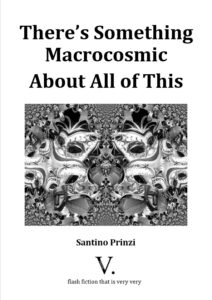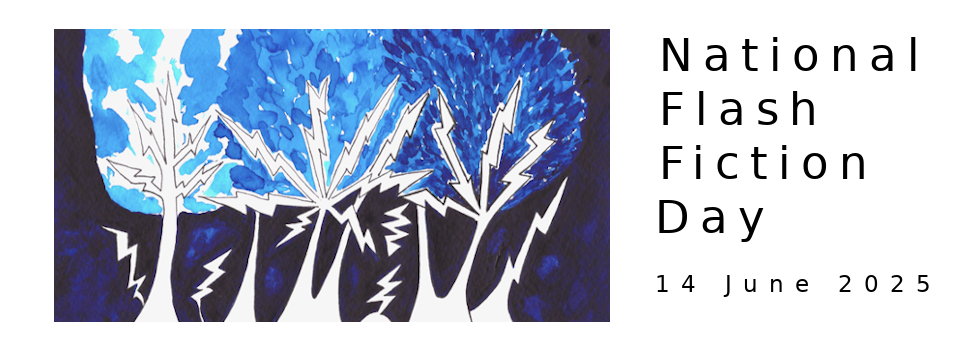Welcome to the fourth in a series of interviews with this year's National Flash Fiction Day anthology editors and micro fiction competition judges! This week, Diane Simmons squeezes out secrets from one of this year's anthology editors, Santino Prinzi...
Diane: The theme for this year’s NFFD anthology is ‘Doors’. Is there anything in particular you are looking for in a submission?
Santino: This is always a difficult question to answer because I’m always surprised and awe-struck by the variety of ways writers interpret our anthology themes. No matter the ways in which I imagine, everyone always takes it to another level. In last year’s anthology, Ripening, authors created such incredibly varied stories about food, taking their stories in directions I couldn't have dreamed.
That’s what I want again this year! I want stories that offer such a unique take on the theme that it’s screaming to be shared with the world. Doors absolutely must be integral to the story – in what way is up to you to decide.
If you’re flummoxed, make yourself come up with 6 different ideas. Not full stories, merely gut responses. This forces you to think harder, to dig deeper. I can almost guarantee idea number 5 or 6 will excite you. Knock on that door, see who answers!
Diane: You are editing the anthology this year with Joanna Campbell. You have worked on previous editions with Meg Pokrass and Alison Powell. Can you explain a little about the editing process and, in particular, whether there is usually much consensus between the two editors over which stories to choose?
Santino: First and foremost: our anthology editors read every single story submitted. Each editor makes a list of their favourite 50 stories from all those submissions and any stories that are on both of the editors’ lists are automatically in. Most years, there’s usually around 20 stories or so that appear on both lists. The editors then discuss which stories fill these remaining spaces. We also only feature one story per person because we like to include as many different perspectives as possible in our anthologies. The only exception to this is when an author has a story selected for the anthology and has placed in the top ten for the micro fiction competition because the micro competition is judged separately.
Editing the anthology is always such a joy. Every guest editor has their own take, their own preferences. Most of all, every editor I have worked with has shown such care and consideration for the stories they read. They take their time, they read and re-read, and they discuss these stories with such insight. I always learn so much working with these wonderful editors. I think that’s what makes these anthologies quite special -- and the stories of course!
After the stories have been chosen, there’s a lot more work to do. I won’t bore you with those details…
Diane: Last year V. Press published your flash pamphlet, There’s Something Macrocosmic About All of This. Can you tell me a little about the pamphlet, particularly what you learned from putting it together?
Santino: There’s Something Macrocosmic About All of This was born from playful disbelief. I almost didn’t send V-Press the manuscript. When they were open for submissions, I thought that it was something I’d love to do but I didn’t have any material. I didn’t want to waste their time.
I write stories about LGBTQ+ people. Not consciously, it just happens more often than not. One evening I collected some of these stories together to what would it look like. I saw connections and common themes that I didn’t see in these stories as individuals. I just went for it. If you don't, it's a no. If you do, maybe it might not be...

There’s Something Macrocosmic About All of This, then, is a series of flashes that attempt to normalise the LGBTQ+ experience. This isn’t, in any way, to devalue LGBTQ+ people and these experiences, but rather to not let these flashes be defined by stereotypes. These characters are LGBTQ+. LGBTQ+ is who they are, it’s not what they do. What happens to the characters in these stories happens to them because they are people. People love, people fight, people learn lessons the hard way. Love is love, an argument is an argument, a lesson learned is a lesson learned.
Regardless of our differences, we share a commonality. I think the title of the pamphlet suggests this too. We’re all a part of something much bigger than ourselves. We exist in our own little world and our perspective of it, but we’re all a part of the bigger story and the shared human experience.
I'm currently working on a full-length collection of flash fiction. I've developed a new writing process which has meant I have a lot of unpublished drafts, and refining this material will be my focus (I hope) after editing the anthology this year. Some of it may even creep out into the world...
Diane: You studied creative writing at Bath Spa University. Was it there that you first encountered flash fiction? And if so, what was your preferred form before that?
Santino: I think most people who study creative writing do so with certain expectations, certain ideas in their head. I didn’t have a preferred form, though I fancied writing YA. I joke that I was going to write a novel that would out-sell John Green. However, as you dive in to study with pre-conceived notions swirling around, you’re encouraged to loosen your grip so you can be open to new possibilities. I attended a reading by a writer who soon became one of my favourites: Tania Hershman.
Tania’s words off the page as well as on them opened my eyes to the possibilities within very short forms, as well as giving yourself permission to experiment and explore the freedom you actually have when writing. If you are not familiar with Tania’s work, buy her books. You’ll thank me later.
Diane: How important do you think titles are in flash fictions?
Santino: Titles are powerful and they’re often underestimated. They can define the meaning of your entire story, or the meaning of the title can slowly shift and fade into various meanings as you progress through the story itself. I like titles that demand my attention, that are risky. All writing, in a way, is about taking risks, so why not take risks with our titles?
Titles are also hard to decide upon, but they don’t need to be complicated. As much as I’m a sucker for a title that’s as mysterious as it is poetic, a simple one-word title can be just as effective. I think the title of our 2017 anthology, Sleep is a Beautiful Colour, is a great example. Helen Rye’s title is unusual, conjures a strong image, creates intrigue and, while reading the story, you understand how it is integral to the flash itself.

Santino Prinzi is a Co-Director of National Flash Fiction Day in the UK, a Consulting Editor for New Flash Fiction Review, and is one of the founding organisers of the annual Flash Fiction Festival. His flash fiction pamphlet, There’s Something Macrocosmic About All of This (2018), is available from V-Press, and his short flash collection, Dots and other flashes of perception (2016), is available from The Nottingham Review Press. As well as a nominee for the Best Small Fictions, Best Microfictions, and the Pushcart Prize, his writing has been published in various magazines and anthologies, including Flash: The International Short-Short Story Magazine, Jellyfish Review, And Other Poems, The Airgonaut, Stories for Homes Anthology Vol.2 and many more. To find out more follow him on Twitter (@tinoprinzi) or visit his website: santinoprinzi.com
SUBMISSIONS ARE NOW OPEN for this year's National Flash Fiction Day Anthology and Micro Fiction Competition. Submissions close on 15th March 2019. For more information, please visit our Anthology and Competition pages.
We are also trying to secure funding to offer free entries to disadvantaged and marginalised writers. If you would like to help us do this by donating entries, please contact us at nationalflashfictionday@gmail.com.
